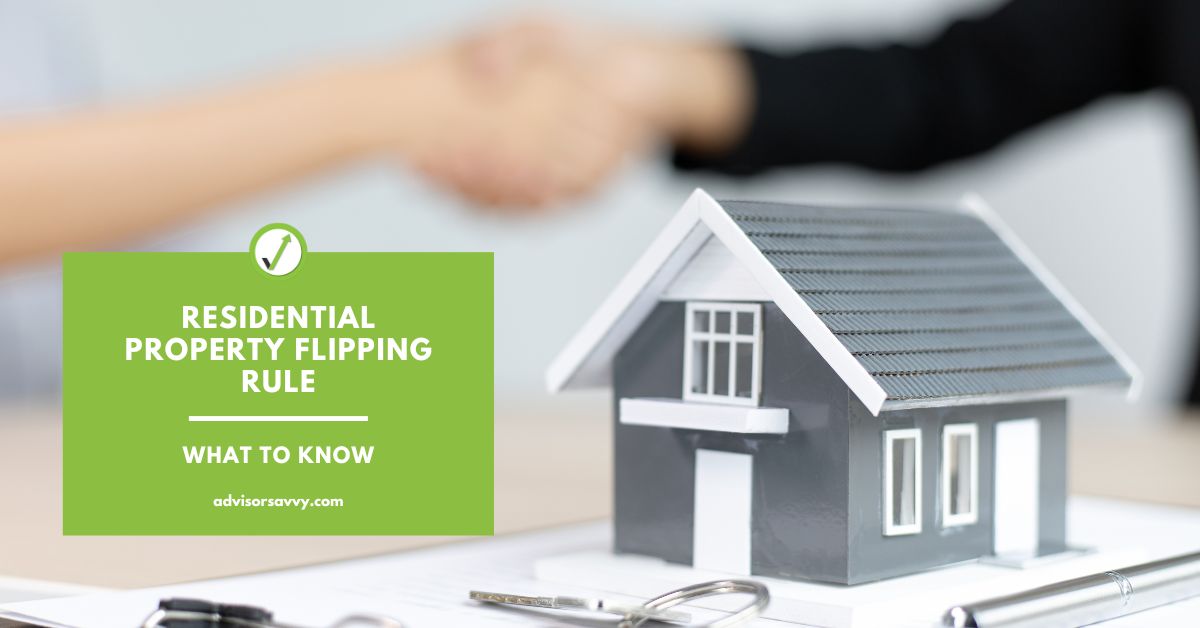
Property flipping involves buying and selling real estate over a short period of time with the goal of turning a profit. With rapidly rising home prices in various parts of Canada, many engage in property flipping. Not only can you make a lot of money doing so, but the tax treatment was quite reasonable, meaning that after-tax profits were generous. However, this all changed with the new residential property flipping rule introduced on January 1, 2023.

Table of contents
In short, these new rules require investors to report income earned from flipping property as business income, not investment income. This results in higher taxes, unless the investor is willing to wait longer than a year to offload their real estate investments. Curious about whether the new residential property flipping rule affects you? Continue reading to learn more!
What is property flipping?
Property flipping is a real estate investment strategy. It involves buying property with the intention of reselling it for profit, rather than using it personally. Often, property flipping occurs on a short term basis, usually within the span of a year or less.
There are a variety of ways to engage in property flipping. Some will hold the property for a period of time allowing it to appreciate, then sell it at a gain. Others may invest in home renovations and other improvements to make it more valuable than it was at the time of purchase, then offload the property for a gain.
There is a lot of potential for earning healthy, steady income through property flipping. However, there are some risks and drawbacks to consider too. For starters, property flipping can drive prices in the housing market. This makes it difficult for people to buy homes to actually live in for the long term. In addition, property flipping can cause volatility in an otherwise stable market which can affect returns for investors.
On a more individual level, investors are required to put a lot of capital into property flipping between the down payment, mortgage payments, and any property improvement costs. The goal is to turn a profit, but investors may not recoup their investment costs. Especially if they’re a beginner who’s still learning the market.
How is the purchase and sale of property taxed in Canada?
Canadians do not pay income tax on the purchase of property. The only taxes that would apply at this stage are property taxes, land transfer taxes and possibly sales taxes. Income tax only arises when a property is sold. At this stage, capital gains tax would apply. This tax applies to half the gain (or loss) of the investment. Some expenses may be applied against the gain, such as legal or real estate agent costs incurred to sell the property. If the homeowner lived in the property as their primary residence, they would also be eligible for the principal residence exemption.
However, income earned from property flipping is strictly considered business income under the new residential property flipping rules. The Canada Revenue Agency (CRA) considers property flipping to be an active business activity which is why it’s not eligible for the typical tax benefits mentioned above. For this reason, it’s not subject to capital gains tax and you won’t be eligible for the principal residence exemption.
Your credit score & report. Always free, forever
It takes 3 minutes to join 20+ million people who trust ClearScore to help them improve their financial future
Fortunately, you can deduct expenses incurred to earn property flipping income on your tax return. Common costs that would be deductible include interest costs, home improvement costs, property listing fees, and home office expenses. The benefit of this is you can reduce your taxable income resulting from flipping property.
What are the new flipping rules in Canada?
Many Canadians have engaged in property flipping as a good way to earn income. However, it has changed the environment of the housing market, such as driving up the cost of real estate. For this reason, the Canada Revenue Agency has enacted some new tax rules surrounding reporting income on flipped property in 2023.
Flipped property is defined as residential housing units located in Canada that were bought and sold in under 365 days. A disposition of a property in less than 12 months may be exempt from the flipped property classification under special circumstances. For instance, the death of a taxpayer or the breakdown of a marriage or common law relationship. Ultimately, the classification depends on the intentions of the taxpayer. If you intend to purchase property and sell it for profit in the short term, then it’s considered flipped property. But if you intend to hold and live in the property, but special circumstances occur, then you can still apply for the principal residence exemption and report the income as capital gains (or losses).
The new flipping rules require Canadians to classify income earned from flipped properties as business income. In other words, the CRA requires you to pay tax on the full income. As opposed to utilizing more favorable tax treatments, like capital gains tax and the principal residence exemption. The same rules apply to properties sold through assignment sales.
What if the flipped property is sold at a loss? The new residential property flipping rule states that the reported income would be zero. More specifically, a loss on a flipped property cannot be claimed on your taxes or applied against other income.
When did the residential property flipping rule come into effect?
The new residential property flipping rule came into effect on January 1, 2023. This means you’re required to report income earned from flipped properties as business income for the 2023 tax season and future tax years. But for any prior tax years, you can claim capital gains and possibly use the principal residence exemption, if you’re eligible.
Why did the residential property flipping rule come into effect?
As mentioned, property flipping is a great way to earn income in Canada. This is particularly true with rapidly rising costs of a home. However, those using this investing strategy reduced taxes by reporting capital gains and using the principal residence exemption. In response, the Canada Revenue Agency implemented the new residential property flipping rule to tax flipped real estate more fairly. The idea is it takes active effort to buy and sell homes for a profit. So, the income is active business income, not passive investment income.
Exceptions to the residential property flipping rule
The main aspects to consider with the residential property flipping rule is real estate was bought and sold within a span of 12 months or less. Plus, the intention of the purchase and sale was to flip the property in a short period for profit. However, a property sale can be exempt from this classification under the following circumstances:
- The taxpayer dies, or a related person to the taxpayer dies.
- There has been a life event whereby a related person is joining the taxpayer’s household. Such as the birth of a child, the adoption of a child, or caring for an elderly relative.
- There is a breakdown of a marriage or common-law relationship of the taxpayer whereby the taxpayer is living separately from their partner for at least 90 days prior to the property’s sale.
- The taxpayer is experiencing a threatening life situation, such as domestic violence.
- The taxpayer or a related person is suffering from an illness or disability.
- Involuntary termination of employment of the taxpayer or the taxpayer’s spouse or common-law partner.
- An eligible relocation of the taxpayer or the taxpayer’s spouse or common-law partner to pursue employment, education or carry on a business.
- The taxpayer becomes insolvent, such as going through a consumer proposal or bankruptcy.
- The property is damaged as a result of a natural or man-made disaster.
To summarize, if you bought and sold a property in under a year, but one of the following conditions applies, you may be exempt from the residential property flipping rule.
How long do you have to live in a house to avoid capital gains in Canada?
If you live in your home full time and do not own any other property, you will be exempt from capital gains through the principal residence exemption. However, if you have multiple properties, such as a home and a cottage, then you would have to pay capital gains tax on the sale of the property that is not your principal residence.
To avoid the residential property flipping rule taxes, you would have to hold property for longer than 365 days. It is better for taxpayers to pay capital gains taxes, and possibly apply for the principal residence exemption. As opposed to reporting income from a flipped property as business income. For this reason, property flippers will be motivated to hold onto their investments for longer than a year.
What is the risk of flipping property?
As with all investing, there are risks associated with property flipping. Below is a summary of the risks:
- Higher taxes. If you flip property within 12 months, you will pay higher taxes under the residential property flipping rules. Income earned from flipped property under these circumstances is considered business income, not capital gains income, under the new rules.
- Market risk. To avoid higher taxes, property flippers are motivated to hold onto investments for longer than a year. Since a lot can happen in 12 months, the investor exposes themselves to more market risk. For instance, if the housing market were to crash, the investor may lose significant amounts of money on their investment.
- Upfront capital. Investing in real estate requires a lot of capital. To begin, you require a down payment. Then, you will have to carry the cost of the investment until you’re able to flip it. This includes mortgage payments, utility costs, and property maintenance fees, potentially others. If you choose to enhance the property through renovations, that’s another upfront cost. There are also costs associated with selling a property, such as listing, agent, and staging costs. For this reason, many investors end up being asset rich but cash poor. There is opportunity for immense profit, but the investor must shell out a lot of cash before they realize this profit.
Your credit score & report. Always free, forever
It takes 3 minutes to join 20+ million people who trust ClearScore to help them improve their financial future
Can you still make money flipping houses in Canada?
Real estate investing is one of the fastest and quickest ways to establish and build wealth in Canada. Historically, people invested in real estate over the long term, but flipping houses has enabled people to profit in the short term. However, if you do not have the cash flow and capital to carry the investment, it’s not wise to get involved in flipping houses. There is a lot of risk involved and if you’re strapped for cash, it’s difficult to overcome those risks. Remember, you can always invest in real estate the old fashioned way by making it your home and holding onto the property long term.
If the risks and new residential property flipping rules don’t seem appropriate for your risk tolerance, you can always explore other investment options, such as stocks, mutual funds, REITs, and ETFs.
Read More: Tax Implications for Canadian Snowbirds

